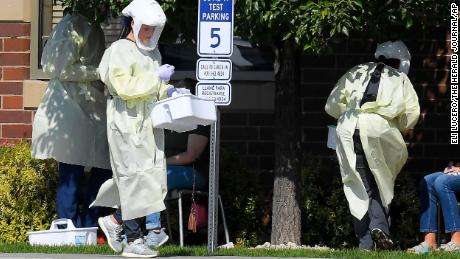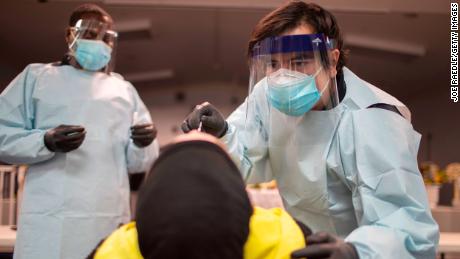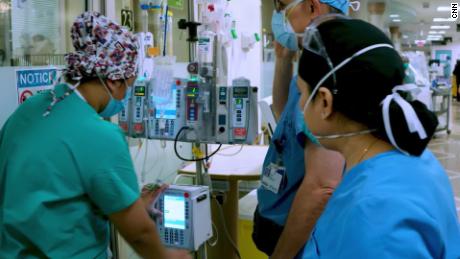(CNN)While schools and universities across the country monitor coronavirus outbreaks with human testing, Utah State University officials announced they've discovered evidence of the virus a different way.
The school found elevated amounts of Covid-19 in wastewater samples collected from four residence halls on campus.
Officials issued a safety alert on Sunday calling for mandatory testing and quarantine of all 287 students living in Rich, Jones, Morgan and Davis on-campus residence halls.
Classes started Monday at the school and some of the students had just moved into their rooms.
The mandatory quarantine is effective immediately and will continue until the test results are returned. USU also activated a Covid care team to arrange for resources to assist the affected students, including meal deliveries.
Wastewater sampling began July 1 and provides an early alert warning to address potential cases, said Amanda DeRito, a director with the university.
"The benefit of testing the water is that we get a snapshot into what is happening on campus and can quarantine even before a student becomes symptomatic. It is also less invasive," DeRito said.
No other testing samples on campus taken this week show elevated levels of the virus and there are currently no reported positive tests for Covid-19 in the quarantined residence halls, according to a university press release.
In mid-August, the CDC announced creation of the National Wastewater Surveillance System to help local public health leaders better understand the extent of the spread of the pandemic in their communities.
Sewage from house and workplaces can be tested for genetic material from the novel coronavirus. Studies show the virus can be found in feces from people who are sick and also from people who don't yet have Covid-19 symptoms.
Testing for all Americans a 'utopian' idea, administration official says
Adm. Brett Giroir, the Trump administration's coronavirus testing czar, on Tuesday dismissed the idea of daily Covid-19 tests for all Americans as "utopian."
"It's great to talk about this utopian kind of idea where everybody has a test every day and we can do that," Giroir said. "I don't live in a utopian world. I live in the real world, and the real world had no tests for this new disease when this first started."
The assistant secretary for health at the US Department of Health and Human Services said that the country now has a "huge diversity" of tests, including a $5 point of care test that provides results within 15 minutes.
"There is no stone unturned, there is no technology that we're not looking at or investing in if it's promising," Giroir said. "We can return to society without having everyone have a test every single day. We can do that. We're showing we can do that.
"There may be a time where everybody can wake up in the morning, pass through a tricorder and tell whether they're infected or not," Giroir said, referring to the fictional handheld device from "Star Trek" that could scan people for data. "We are not there yet."
Testing availability and speed has improved in the US, particularly since the disastrous spring delays. Giroir said 91.9% of results from major referral labs, which do about half the tests in the US, were completed in three days. The mean turnaround time in August for large referral labs was 2.27 days.
Still, that 2.27-day average delay allows the virus to quietly spread, and public health and lab industry experts have repeatedly called on the federal government to take a larger leadership role in coordinating testing supplies.
US Rep. James Clyburn of South Carolina, the House majority whip, responded to Giroir's comments by saying, "It would not be utopian if we had a national program to combat this pandemic. It may be going state by state. But one national program would not be utopian at all."
CNN Senior Medical Correspondent Elizabeth Cohen indicated that Giroir was attacking a straw man. Testing is an important part of public health strategy, but no one seriously argues testing can solve everything alone.
"He says, 'People say we can test our way out of the pandemic.' I have never heard anyone seriously say that," Cohen said. "He needs to stop making up these boogie men who he's fighting against. No one is telling him we need a utopia. We're just telling him he needs to do better."
Dr. Ashish Jha, director of the Harvard Global Health Institute, noted on Twitter that the White House staff has widespread testing, as do sports leagues such as the NFL.
"It's not utopia to want to test teachers & kids to return to school, nursing home residents to stay alive, first responders and other essential workers," he wrote. "Sure, lets call it utopia when it's for the less privileged."
Dire warnings for Iowa
A White House coronavirus task force report sent to officials in the state of Iowa this week warned of dire new case increases across rural and urban areas and called for a mask mandate, the closure of bars, and for university towns to do more as the pandemic intensifies in the Midwest.
CNN has obtained the nine-page August 30 report for the state, first reported by the Des Moines Register, from the Iowa Department of Public Health. The task force releases state-by-state reports each week to governors' offices, and has so far declined to make them publicly available.
The report says that Iowa is in the task force-defined "red zone" and warns that the state has the highest rate of cases in the US, which increased by 77.4% from the previous week.
Campus outbreaks
In the report, the task force points to universities as a major factor contributing to the virus's spread.
The three counties with the highest numbers of cases also have large student populations: Story County, home to Iowa State, and Johnson County, home to University of Iowa, as well as Polk County, which contains Iowa's largest metro area, Des Moines.
The university crossed the 1,000 active case mark on August 29 when it reported 302 cases in a single day. The overall current case load, including employees, is 1,026.
Other schools reported outbreaks.
At the University of South Carolina, 1,017 students currently have Covid-19, according to the university's coronavirus dashboard, making it one of the highest case counts recorded at a college so far.
Despite the climbing active case count and the fact that 60% of the university's designated quarantine space is in use, according to its dashboard, the school still lists its' alert level as "low."
The University of Missouri has 424 active student Covid-19 cases, according to the school's Covid-19 dashboard. James Madison University is reporting 138 new Covid-19 positive cases among its students and employees since Monday, according the JMU dashboard.
More than 20,000 cases of Covid-19 among students and staff have been reported at colleges and universities across at least 36 states, according to a CNN tally.
The campus reopenings represent new coronavirus hot spots in a country with plenty enough already as the US surpassed 6 million total confirmed cases on Monday.
NIH rejects plasma treatment
A National Institutes of Health panel said there's no evidence backing the use of convalescent plasma to treat coronavirus patients and that doctors should not treat it as a standard of care until more study has been done.
"There are insufficient data to recommend either for or against the use of convalescent plasma for the treatment of COVID-19," the panel of more than three dozen experts said in a statement posted on the NIH website.
The statement, which was posted quietly, contradicts the Trump administration's characterization of the treatment as "historic" and a "major advance" and directly refers to last week's emergency use authorization by the US Food and Drug Administration.
Also Tuesday, an independent committee said any eventual coronavirus vaccine should go first to the people most at risk of catching it.
The draft report from the National Academies of Sciences, Engineering and Medicine makes recommendations similar to those that have come from other groups, but it goes into detail to explain why health workers, for instance, should be among the first to get a vaccine.








